- Home
- M. K. Hume
Prophecy: Death of an Empire: Book Two (Prophecy Trilogy) Page 8
Prophecy: Death of an Empire: Book Two (Prophecy Trilogy) Read online
Page 8
Left with little choice but to comply, Myrddion set Cadoc and Finn to work, after first cautioning them to keep their mouths shut and to make no threatening or aggressive gestures.
‘We walk between sword points, Cadoc,’ Myrddion whispered. ‘So keep that temper of yours in check. Better the Frankish king than the Hun.’
‘Aye, master,’ Cadoc replied, and then grinned widely. ‘Whoever this devil spawn might be, I’ll wager he’ll be no match for our own particular demon.’
Gwylym gave no sign that he had heard their brief exchange, but Myrddion sensed a great darkness in the Celt that made his flesh creep with presentiment.
Before the ruddy moon had set, the wagons had left Parigi far behind and the party was travelling along a thinly wooded path, far from the Roman road that led to Aurelianum. By Myrddion’s reckoning, they were heading towards the east and relative safety, if such a thing could exist in this land of casual, ruthless carnage. As a weak sun rose over the far horizon, Gwylym called a halt to the journey and indicated that they would rest in the shadow of the trees. The horses were soon freed from their traces and hobbled, so the exhausted, hungry and thirsty members of the troop were free to tumble into a brief and dreamless sleep.
CHAPTER IV
THE SEA DEMON
The nearby river was wide, dark and forbidding, and a well-constructed Roman bridge spanned its sullen, lightless depths. Myrddion had been unable to sleep so, cat-footed, he had slid from shadow to shadow until he now stood under a nacreous moon, which was reflected in the sluggish waters. Within the cocoon of night, he felt blessedly alone.
‘Courting the Huntress, healer?’
Gwylym had reached Myrddion’s refuge in the centre of the bridge without a single telltale sound. For such a large, well-rounded man, his feet were almost unnaturally silent, and in the shadows of his prominent brows only the odd flicker of light betrayed his ambiguous eyes.
Myrddion had been alarmed by the Celt’s silent approach, but some deep instinct warned him to mask any concern. Instead, he smiled with a flash of white teeth, endeavouring to show no fear of his companion and captor.
‘Aye. We Celts are all a little moon-mad, although my allegiance is to Ceridwen and the Mother, whose name must not be spoken by any man. What of you, Gwylym? What god, or gods, own your soul?’
The older Celt chuckled sardonically. ‘None, healer. I make no apologies for my godless state and prefer to set my star by my lord Merovech, and after him by Childeric, his son. I put my faith in men rather than in gods, and I would have thought that you’d be the same. You seem to be a man of common sense rather than superstition.’
‘I give my worship to the gods as my grandmother taught me, but my allegiance to any man is hard won,’ Myrddion replied with a spot of colour on each cheekbone. For once, the young man’s careful control had deserted him, although in the darkness Gwylym couldn’t detect the sudden rush of colour to his cheeks.
‘Aaah! I sense a touch of human emotion, healer. I’m flattered! So you are chary of the ties of loyalty.’
‘Is it loyalty to serve blindly?’
‘Yes!’
This rapid-fire exchange left both men, the young and the old, standing only a few inches apart with fists clenched by their sides. Myrddion was the first to realise the ridiculousness of the discussion and he stepped away from Gwylym’s dangerous proximity.
‘I serve no one person with blind devotion, Gwylym, but I am pleased to learn of the differences that lie between us. But I’m still confused. Why would a Celt turn his back on his fellow countrymen?’
Gwylym glanced up at Myrddion’s dark, largely invisible face and blinked rapidly, like a raptor measuring the space between himself and his prey. Under the enlarged moon, the older Celt’s eyes had the sudden sharpened perception of the killer falcon freed from the hawker’s glove.
‘Harsh words, Myrddion-no-name! I’ll give you the answer to that question in my own good time, but for now you must return to your sleep. I know Lord Childeric well, and he’ll move us fast and hard through this easy country until we reach the relative safety of Châlons. Attila is upon the land, like a scourge from heaven. The Hun warriors believe that Attila bears the Spirit of Death into every battle in the form of an ancient iron sword that is almost godlike to the superstitious among them. For our part, we are blinded by a lack of good intelligence, so Childeric will lash us onward until we’re all half dead from exhaustion. So you will need all the rest you can get to survive the journey – and your interrogation by my king. With luck, Flavius Aetius won’t be there to cause you even more discomfort.’
Myrddion stepped away from Gwylym, knowing that he had conceded the argument to the older Celt. The healer laughed quietly and Gwylym frowned in response, as if he was puzzled by Myrddion’s reaction.
‘Then I’ll take your advice, Gwylym. You know the trials we will face, not I. But I fear you’ll be disappointed in me, for I’ll not willingly serve another master, no matter how royal.’
‘You’ll not?’ Gwylym chuckled from the cool night shadows. ‘I warrant you’ll serve my master, for he’ll find some reason that will tempt you – one way or the other. If he decides he wants you, King Merovech will have you.’ With these threatening words, he strode back the way he had come until he merged once more with the shadows.
‘That old man moves like a cat – or an assassin,’ Myrddion whispered grimly into the soft breeze. ‘But he’s right. If these local kings want me, then I’ll have little option but to obey them.’
Dreams chased the young healer throughout the few hours of his rest. He saw the heavens split and a huge iron sword dive, blade first, out of sullen, livid skies to pierce, point down, into the barren earth below. Thrumming with menace, the archaic weapon reared over an arid plain like a portent of disaster. Then, in the inexplicable fashion of dreams, the blade began to bleed and a tide of sanguine gore seemed to wash over the whole, dry land until Myrddion believed that he would drown in a viscous flood of red.
A booted foot to the ribs roused him from his trance before the sun rose. Rhedyn handed her master a bowl of cold stew and a large wooden spoon. As the healer ate the grey mess reflectively, he saw that his apprentices had already set the horses into their traces and had struck camp.
Myrddion sighed, and poured water over his face from the leather bag that was kept slung over the wagon’s side. The cold water shook his blunted wits back into a semblance of order and gave him the illusion of cleanliness. The worst part of any long journey, from Myrddion’s point of view, was the lack of opportunities for personal hygiene.
The town of Châlons lay on the bank of a large river flowing through wide plains that were fertile in agriculture and trade. Plentiful water, a gentle climate, rich soil and long rows of poplars and vines had created an ordered, earthly Eden. Only a few low hills set off a countryside that was largely flat, except for the folds carved by the many streamlets and rivers that flowed slowly through the idyllic landscape. In this alien world of green, blue, beige and gold, Myrddion longed for the misty greys and charcoals of his mountain home.
Châlons possessed the obligatory stone walls of any prosperous city, and additional clusters of hamlets had grown up around the outskirts. Green spear-points of growth from fruit and olive trees testified to good husbandry, and vegetables of all kinds grew in neat rows around simple workers’ cottages, resembling flower beds in their regimentation and crisp beauty.
The roads and byways leading to Châlons were thick with traffic. Christian Arian priests in dirty white and Catholics in dusty black robes walked side by side with peasants carrying heaped baskets of goods bound for the marketplace. Crisp cabbages as large as a man’s head, bags of new turnips, the first legumes of spring and baskets of brown farm eggs nestling in straw competed with new-born lambs, calves and chickens carried in wicker cages as the produce of the rural communities found its way into this major market town. Men in dirty togas, visitors in alien finery and rows of petty princeling
s bound for the court of Merovech and the Visigoth lords vied for space with peasants on the congested, dusty gravel.
The Frankish horsemen negotiated the bustling traffic with relative ease, forcing a path for the wagons through the throng until Myrddion eventually saw the gates of Châlons looming before them.
‘I don’t like our chances here if the Huns should attack,’ Finn murmured quietly to Myrddion as he urged his horses through the heavy wooden gates. ‘I wish we knew where the devils are. We’ve seen the fate of town dwellers throughout our journey, so I’d prefer to sleep in the open air.’
Myrddion nodded, and then pointed to the wooden ramparts built on the inside of the stone fortifications. ‘At least young warriors are manning the walls, which is an improvement on the defences we saw at Tournai and Cambrai.’
Finn peered up at the red-cloaked men who stood at regular intervals along the wall, their disciplined eyes obviously scanning the surrounding countryside for signs of unusual activity. ‘Aye! Châlons is definitely not Tournai. This town won’t be taken without warning, so I suppose we should be grateful for that small mercy.’
‘Yes, we should be grateful,’ Myrddion muttered under his breath as the wagons negotiated roads so narrow that they almost scraped the plastered buildings lining the cobbled roadways. ‘Perhaps the gods protect the ignorant.’
An unnatural silence had enveloped the quiet streets and, as they passed, women glanced up at Childeric’s face, dropped their heads respectfully, then dragged their squabbling children inside brightly painted doors that were closed firmly behind them. ‘Whatever else Châlons might be, its population is loyal to their king and his Roman ally,’ Myrddion added, thinking of his earlier conversation with Gwylym on the moon-drenched bridge.
Neither man spoke again until the cavalcade reached a small cul-de-sac of stone and wooden buildings decorated with shuttered window openings. These buildings were narrow-fronted and opened straight onto the cobbled roadway, where a guard of red-cloaked warriors directed foot traffic away from the seat of power to other, less important streets of the township.
‘You’ll be billeted in the guards’ quarters until Merovech and the allied kings are ready to give you an audience,’ Gwylym explained, as Myrddion climbed down from the wagon’s high seat. ‘Don’t fear for your possessions. As you can see, the king’s guards are always alert and no one would dare to filch anything from one of the king’s guests.’
Myrddion nodded, but snatched up his satchel and a small pack of personal possessions as he gazed around at the narrow, looming buildings. The upper storeys, where the healers were to sleep, were built of wood, and as Myrddion and his followers negotiated a set of narrow, ladder-like stairs their nostrils were assaulted by the mingled smells of dried fish, cooked cabbage and male sweat. Myrddion’s nose wrinkled with distaste.
‘If you wish to bathe, a well is situated behind this building,’ Gwylym added from the ground floor. ‘I’m afraid that no Roman epicures dwell in Châlons.’ Then he disappeared into the shadowy interior, his rasping chuckle trailing behind him like a crude insult.
Myrddion examined the bleak room with misgiving. It lay directly under the roof and he could barely stand upright without striking his head on the pegged rafters. Straw had been laid out for pallets, but the mice had found it first, and the dim recesses of the room reeked of urine and the musty smell of long dead vermin. The raw wooden walls were unpainted and the floors could be seen to be slick with grease wherever they were exposed to the light.
Only a few pieces of rickety furniture provided an inadequate promise of comfort. A pair of home-made stools that canted alarmingly off centre, a table with inexpertly formed, uneven legs and a piece of oiled cloth nailed over the single window to keep out the inclement weather completed the depressing list of the room’s appointments.
‘Rhedyn, find out where food is prepared, will you?’ Myrddion asked once the women had trooped doubtfully into their new quarters. ‘And we’ll need water, Finn! You always know where to winkle out buckets.’ He glanced around the stuffy room and absorbed the appalling lack of cleanliness and hygiene. ‘Cadoc, see about a broom, or anything that will help us to clean this pigsty. The place stinks of piss and sweat.’
Two of the widows, Brangaine and Bridie, were soon at work, clearing the floor bare of the malodorous hay and then scrubbing the wooden boards, the table and the stools with stiff brushes made of boar’s hair. The air soon became golden as motes of hay, dust and the accumulated grime of many years began to float through the room. When Brangaine set off in pursuit of a mouse, her switch broom wielded with murderous intent and Willa giggling at the fuss, Myrddion decided that he would explore the small cul-de-sac until the widows had imposed order on their new quarters.
When they had first arrived, the healer had noted that the bones of the buildings in the small cobbled street were Roman in style, but a local twist invested the narrow stone facades with an exotic, purely Gallic appearance. Wooden shutters gave the windows an odd, blind look that was strangely unsettling. More surprising to Myrddion, who was used to the grey, flinty stone buildings of his homeland, was the use of coloured pigments which had been applied over the plastered stones in faded washes of pastel yellow, brick red and a peculiar hue of charcoal grey. The shutters were lime-washed a brilliant white that added contrast to these architectural oddities, and large, hand-thrown pots were filled with earth to sustain flourishing young lemon trees that were already heavy with tiny green fruit.
His eyes wide, Myrddion stared around the mellow buildings. A series of rough gates made of lime-washed wood sealed the narrow alleyways between them. Curious, Myrddion pushed open the gate that separated the largest structure from the barracks where they were housed and, to his surprise, the gate gave way with a squeal of rusting iron hinges. Beyond the coarse timber, the darkened alleyway promised cool, indigo shadows after the dazzling sun of the cul-de-sac.
His curiosity piqued, Myrddion passed through the gateway and entered the narrow, dark tunnel between the stone buildings.
The absence of sunshine had promoted the growth of lush ferns and moss where water collected in stone hollows against the walls. The sudden coolness was a balm to Myrddion’s sun-blinded eyes, but the cobbles under his feet were slippery with black slime. Keeping to the middle of the alleyway for safety, he picked a path towards the rear of the buildings.
As he made his tentative way through the alley, he noticed that there were no windows to threaten the security of the house on either side. Narrow apertures on the upper floors were secured with odd-shaped iron straps that were securely bolted into the stone. Entry into the buildings from the alley was rendered impossible. ‘Someone has a penchant for safety,’ Myrddion murmured to the empty laneway as he moved towards the brilliant splash of sunlight that signalled the end of the narrow tunnel.
‘Ah!’ he breathed as he stepped out into the enclosed space that backed onto both the guardhouse and its neighbour. His surprise would have been laughable if anyone had been present to see his slack mouth and round, amazed eyes as he gazed at the scene that lay before him.
The narrow, dark alleyway opened onto a rising series of broad terraces bounded by high fieldstone walls. Within this enclosed area, a large roofed structure protected a fire-pit, complete with spit, several brick ovens and a smaller fireplace constructed for the preparation of lesser meals. Two rock walls sheltered this outdoor kitchen from the elements, while an alcove served as storage space for a neat stack of firewood.
At the rear of the more imposing of the two buildings flanking the alley, a well was centred on the lowest terrace beside which several decorative fruit trees were planted. The petals had already fallen and small citrus fruits were forming on the branches. Myrddion tried to imagine the size, shape and taste of the grown fruit but, as he had never seen an orange, he could only marvel at the pleasant smell of the leaves when he crushed them between his fingers.
A series of stone benches were laid out where i
dlers could sit in the shade of the building and enjoy the bars of brilliant sunshine, the deep green of several narrow pine trees and a riot of vivid scarlet flowers that created a colourful splash under the impossibly blue sky. Against his better judgement, Myrddion leaned against the wall and drew the lightly scented air deep into his lungs.
‘And who might you be, to enjoy the pleasures of my garden without permission?’ A deep, resonant voice cut through Myrddion’s reverie, shattering the feeling of peace and well-being that had embraced him. He raised his eyes.
The woman who stood on the terrace was slender and very tall, so that she almost reached Myrddion’s own height. Her colouring was vivid, with lips that were pomegranate red and glistening over her large, beautiful teeth. Those lips were full, bee-stung and voluptuous, and an incongruous counterpoint to her imperious, patronising voice.
‘Well, clod, I’m waiting for a very good explanation,’ she continued in perfect Latin. ‘Or must I set my guards to teach you a lesson in manners?’
Completely confused, Myrddion met a pair of snapping eyes which possessed an unmaidenly directness that made the young man’s hackles rise. The fine-boned, aristocratic face was topped by a head of rich auburn hair that shaded from carrot red into gilded bronze. Its owner was obviously wilful and impetuous by nature, her aquiline features suggesting charm and temper in equal measure.
Conscious of his rough clothes and dusty hair, Myrddion bent his head in a deep, courtly bow.
‘Forgive me, my lady. I am Myrddion of Segontium in Britain. I have been billeted in the guardhouse next to this building on the orders of Prince Childeric, so that his father might question me. I am a healer and I have come to these lands with my apprentices and servants, seeking knowledge of my craft.’
The lady raised one dark brow sceptically and Myrddion noticed that she had a rare abnormality. Now that he had collected his wits sufficiently to examine her properly, he observed that her right eye was a northern, arctic blue, while her left eye was a clear, dark-rimmed green.

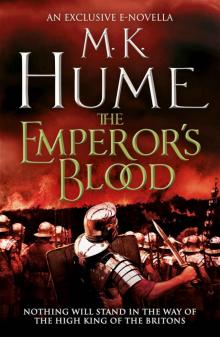 The Emperor's Blood (e-novella)
The Emperor's Blood (e-novella)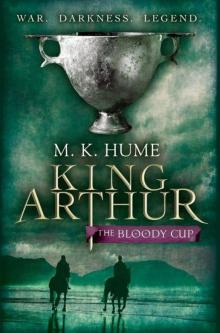 King Arthur: The Bloody Cup: Book Three
King Arthur: The Bloody Cup: Book Three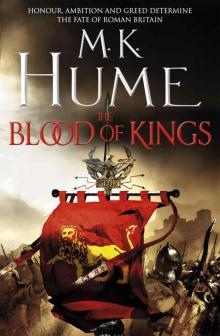 The Blood of Kings: Tintagel Book I
The Blood of Kings: Tintagel Book I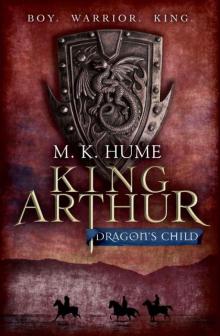 King Arthur: Dragon's Child: Book One (King Arthur Trilogy 1)
King Arthur: Dragon's Child: Book One (King Arthur Trilogy 1)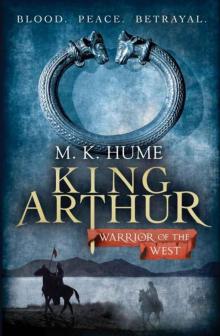 King Arthur: Warrior of the West: Book Two
King Arthur: Warrior of the West: Book Two The Storm Lord
The Storm Lord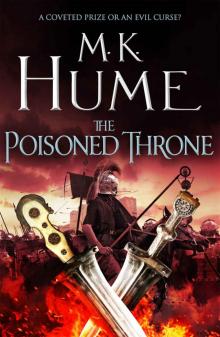 The Poisoned Throne: Tintagel Book II
The Poisoned Throne: Tintagel Book II![M. K. Hume [King Arthur Trilogy 04] The Last Dragon Read online](http://i1.bookreadfree.com/i2/04/07/m_k_hume_king_arthur_trilogy_04_the_last_dragon_preview.jpg) M. K. Hume [King Arthur Trilogy 04] The Last Dragon
M. K. Hume [King Arthur Trilogy 04] The Last Dragon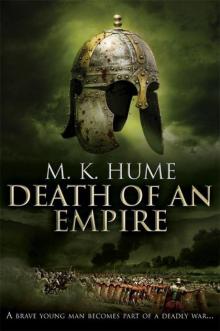 Prophecy: Death of an Empire: Book Two (Prophecy Trilogy)
Prophecy: Death of an Empire: Book Two (Prophecy Trilogy)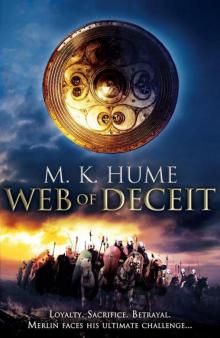 Prophecy: Web of Deceit (Prophecy 3)
Prophecy: Web of Deceit (Prophecy 3)